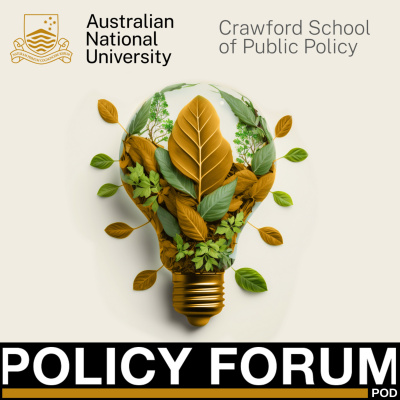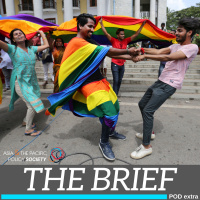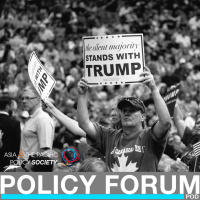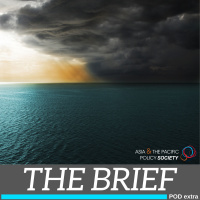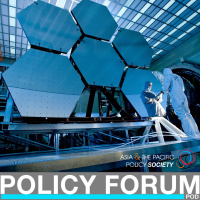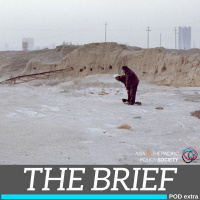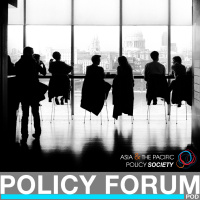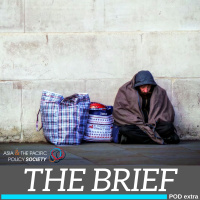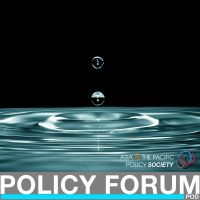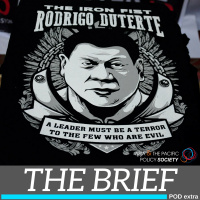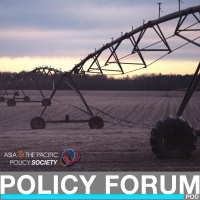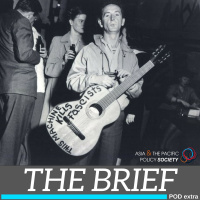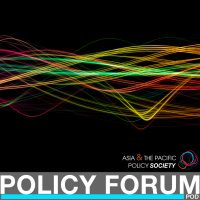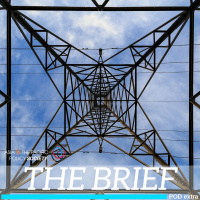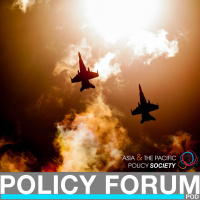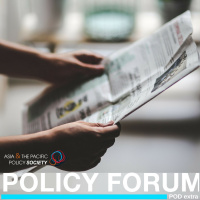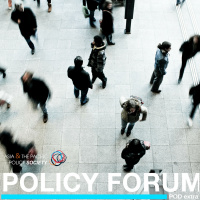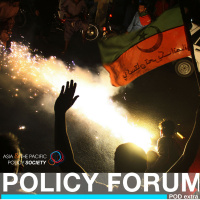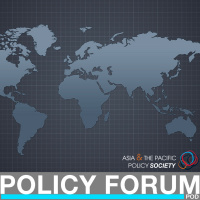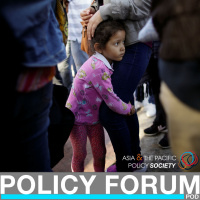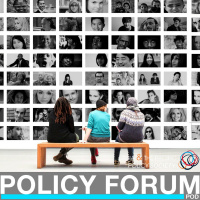Sinopsis
Policy Forum Pod is the podcast of Policy Forum.net - Asia and the Pacific's platform for public policy debate, analysis and discussion. Policy Forum is based at Crawford School of Public Policy at the Australian National University.
Episodios
-
The Brief: Taking bigotry off the books in India
24/09/2018 Duración: 23minHome to over 15 per cent of the world’s population, India’s recent decriminalisation of homosexuality will affect millions of LGBT citizens. But social attitudes can be more important than the law. Questions of sexuality notoriously stir up strong religious, cultural, and moral beliefs – and inspire passionate resistance. On this episode of The Brief, Wayne Morgan breaks down the interplay of culture, colonialism, politics and law in the wake of India's landmark decision. Professor Wayne Morgan is Associate Professor at the ANU College of Law. He is recognised internationally as a pioneer in the field of queer legal theory. His research focuses on social justice and law reform, primarily in the areas of human sexuality, gender identity and legal regulation Edwina Landale is the presenter of The Brief. She is a student of Politics, Philosophy, and Economics at the ANU. Show notes | The following were referred to in this episode: Navtej Singh Johar & Ors. versus Union of India thr. Secretary Ministry of Law
-
Power to the people?
21/09/2018 Duración: 47minFrom the corridors of Brussels to the streets of New Delhi, populist politics have swept through democracies around the globe. But despite all the headlines, is this wave of populism particularly new? And should we see it as a symptom of democracy in decay, or rather as a welcome sign that politics is returning to the people? On this week’s podcast, hosts Nicky Lovegrove and Sara Bice hear from Duncan McDonnell, Jill Sheppard and Paul Kenny about populism in Europe, Asia and Australia – with due mention to one particularly powerful populist leader sitting in the White House. Professor Duncan McDonnell is Professor of Politics in the School of Government and International Relations at Griffith University. His main research interests are political parties, populism and Euroscepticism. Dr Jill Sheppard is a political scientist at the School of Politics and International Relations at the Australian National University. Her research focuses on why people participate in politics, what opinions they hold and why, an
-
The Brief: Designing for disaster
17/09/2018 Duración: 22minHurricanes, typhoons, earthquakes and landslides – headlines this month have been overflowing with natural disasters. The Asia-Pacific is known as the most disaster-prone region in the world, and its policymakers are under pressure to design its rapidly growing urban centres to withstand catastrophe. How can they prepare for events which are destructive, unpredictable, and don’t respect national borders? In this episode of The Brief, Edwina Landale talks to David Sanderson about why poor countries suffer the worst disasters, how urbanisation and technological change could shape the future of disaster resilience, and how Australia is failing its Pacific neighbours. Professor David Sanderson is the inaugural Judith Neilson Chair in Architecture at UNSW, and is an expert in designing for disaster. David has over 25 years’ experience working in development and emergencies and has carried out a number of assignments for NGOs and donors across the world. Edwina Landale is the presenter of The Brief. She is a studen
-
What do policymakers think of scientists?
14/09/2018 Duración: 01h14minLast month, our podcast to mark National Science Week in Australia took a look at how scientists can make themselves heard by policymakers. This week, we’re turning the tables. We hear from two senior figures in Australia's policy-making process about what it’s like to be at the pointy end of policy creation and formulation, and receiving input – wanted and unwanted – from scientists. Hosts Bob Cotton and Sue Regan chat to Ian Chubb, former Chief Scientist of Australia, and Taimus Werner-Gibbings, Chief of Staff to Tasmanian Senator Lisa Singh. They discuss how to get evidence and data on the desk of a politician, the future of science in policymaking, and Ian’s personal story of putting his life in the hands of an experimental cancer treatment. Listen here: Ian Chubb has had a long and distinguished career as a neuroscientist and an academic. He has served as Vice-Chancellor of both Flinders University and the Australian National University, and has been made a Companion of the Order of Australia. He served
-
The Brief: China’s Xinjiang police state
10/09/2018 Duración: 21minAs part of its ‘strike hard’ campaign, the Chinese state claims to be fighting against the “Three Evil Forces” – terrorism, separatism, and religious fundamentalism. Under this banner the government has reportedly forced close to a million Uighur and minority Muslims into internment camps and reeducation centers. In this episode of The Brief, Edwina Landale talks to Thomas Cliff about the human and cultural impact of mass surveillance in Xinjiang, what the Communist Party finds so threatening about the Uighur minority, and the future of cultural diversity under President Xi Jinping. Thomas Cliff is a Postdoctoral Fellow in the School of Culture, History and Language at the ANU. He has conducted long-term fieldwork in Xinjiang, covering over two decades, and is one of the world’s leading experts on Xinjiang. Edwina Landale is the presenter of The Brief. She is a student of Politics, Philosophy, and Economics at the ANU. Show notes | The following were referred to in this episode: 66 Years and counting – Tibet
-
Podcast: Putting community engagement in the neighbourhood of good policy
07/09/2018 Duración: 40minImagine you’re a philanthropist with a big pot of money and a pressing social problem you’d like to solve in your city. You gather all the best academic knowledge on the topic, employ an army of consultants to design a cutting-edge solution, and announce the initiative to great fanfare on live television. So far so good, right? Well, if your philanthropic policy-making forgot to talk to the people who might actually be affected, you could find it does a whole lot more harm than good. Such top-down approaches to policy are all too common – and it’s partly because involving the community in decision-making can be difficult and time-consuming. On this week’s podcast, hosts Martyn Pearce and Sue Regan hear from Paul Schmitz, one of America’s most influential non-profit leaders and an expert in community engagement. Topics discussed include the best and the worst cases of community involvement in public policy, how to know whose voices to listen to, and why poor people might be experts on escaping poverty. Paul Sc
-
The Brief: too close to home
03/09/2018 Duración: 18minThe most recent Australian census counted 116,427 as being homeless – more than enough to fill the Melbourne Cricket Ground. Even more shocking are the hidden dimensions of this number: 20 per cent were Aboriginal and Torres Strait Islander Australians, 30 per cent were born overseas, and reports show that older, single women are increasingly affected. On this episode of The Brief, James O’Donnell discusses why people become homeless, how they escape it, and why we need flexible policy solutions if every Australian is to have a roof over their head. James O’Donnell is a PhD candidate and research assistant at the ANU school of demography, and winner of The Australian Population Association’s 2014 WD Borrie Prize. Edwina Landale is the presenter of The Brief. She is a student of Politics, Philosophy, and Economics at the ANU. Show notes | The following were referred to in this episode: Everybody’s Home Specialist Homelessness Services (SHS) Orange Sky Laundry Beam St Vincent De Paul The Red Cross Policy Forum
-
Impact made easy
31/08/2018 Duración: 49minIt’s the buzzword that has universities around the world more obsessed than political junkies waiting to hear who has won a leadership spill. But unlike the average Australian Prime Minister, the quest for ‘impact’ among academics is likely to be with us for a long time. What exactly does it mean for researchers to ‘make a difference’? What tools can they employ to ensure their work doesn’t live only in obscure academic journals, unread and unused by policymakers? On this week’s podcast, hosts Sharon Bessell and Sara Bice chat to Mark Reed, a Professor of Social Innovation and an expert in research impact. Mark Reed is Professor of Social Innovation at Newcastle University in the UK, specialising in stakeholder participation in agri-food systems. He has published over 150 publications, including handbooks on research impact, and he’s been cited more than 12,000 times. He runs Fast Track Impact, a company that trains researchers to be more productive and achieve real-world impact. He presents the Fast Track Im
-
The Brief: Courting Duterte
27/08/2018 Duración: 20minPresident Rodrigo Duterte’s reputation for controversy and his ‘War on Drugs’ that has seen thousands of deaths has drawn international media attention. Seen as an authoritarian strongman leader abroad, Duterte nevertheless maintains high approval ratings at home, and is seen by many Filipinos as a relatable leader. In this episode of The Brief, Edwina Landale talks to award-winning journalist Marites Vitug, author of a new book, Rock Solid: How the Philippines Won Its Maritime Case Against China. They discuss Filipino populism, the integrity of the justice system, and the potential fallout from the South China Sea dispute. Marites Vitug is the editor at large of the social news network Rappler. She is one of the Philippines’ most accomplished journalists, winning awards and public recognition for her reporting. A bestselling author, she has written several books on Philippine current affairs, including her recent book Rock Solid: How the Philippines Won Its Maritime Case Against China. Edwina Landale is the
-
Water waste: the dangerous paradox of irrigation efficiency
24/08/2018 Duración: 46minAs much as 70 per cent of all water extracted in the world is used for irrigation. But what if it were discovered that irrigation policies intended to increase efficiency and therefore save water could, in fact, be doing the exact opposite? On this episode of Policy Forum Pod, hosts Maya Bhandari and Bob Cotton hear from Quentin Grafton and Sarah Wheeler, two authors of a new paper published in Science: “The Paradox of Irrigation Efficiency”. Topics discussed include the Murray-Darling Basin, why regulatory bodies are so often captured by industry – and how our water policies have left us up the creek without a paddle. Quentin Grafton is Professor of Economics at Crawford School, an ANU Public Policy Fellow, and Director of the Centre for Water Economics, Environment and Policy. He is also Editor-in-Chief of Policy Forum. Professor Sarah Wheeler is an Australian Research Council Future Fellow and the Associate Director of Research with the Centre for Global Food and Resources at the University of Adelaide. Sh
-
The Brief: mixing pop and policy
20/08/2018 Duración: 24minFor centuries, music has been an integral part of social movements – the civil rights movement is synonymous with jazz, Aretha Franklin’s Respect is a feminist anthem, and hip-hop is woven into contemporary racial politics. As the world faces an era of uncertainty, from escalating trade wars and shifting global power dynamics, to an environmental crisis and the echoing siren call of ‘Fake News’, is music doing its bit to inspire action and fuel a demand for change? Edwina Landale talks to Kim Cunio about a musician’s responsibility to communicate social issues and the role of music as an instrument to amplify unheard voices. Dr Kim Cunio is a Senior Lecturer in composition and musicology in the School of Music of The Australian National University. He is an accomplished researching composer and performer and was awarded an ABC Golden Manuscript Award in recognition of his work with traditional music. Dr Cunio is published by the ABC, records with New World Music and lectures in composition. Edwina Landale is
-
Putting science and policy on the same wavelength
17/08/2018 Duración: 54minCan scientists make facts great again in an era of fake news? How can we get more young people and women studying STEM – Science, Technology, Engineering and Maths? Is humanity heading towards a science utopia or dystopia? It’s National Science Week in Australia, and on this podcast we hear from four scientists working across physics, psychology, engineering, and climatology: Susan Scott, Eryn Newman, Elanor Huntington and Mark Howden. In a wide-ranging interview, hosts Maya Bhandari and Sue Regan lead a discussion on how researchers can make themselves heard by the public and respected by policymakers, why science must find more common ground with the humanities, and why we need a new engineering for the 21st century. Professor Susan Scott specialises in gravitational physics at the ANU Research School of Physics and Engineering. Susan was part of the team behind the breakthrough discovery of gravitational waves, winning awards for the way the science was presented to the media. Professor Elanor Huntington i
-
The Brief: Australia’s National Energy Guarantee
14/08/2018 Duración: 19minThe Australian federal government is currently seeking commitment from states and territories for a National Energy Guarantee – also known as the NEG. The NEG aims to improve the reliability of Australia’s electricity grid while at the same time meeting a modest emissions reduction target, and the government hopes it can end years of political deadlock on energy and climate policy. So is the NEG a sign of progress in Australia’s divisive energy debate? What will it mean for carbon emissions and the renewable energy industry? In this first episode of The Brief, Edwina Landale hears from James Prest from the ANU Energy Change Institute. Dr James Prest is a Senior Lecturer at the ANU College of Law, specialising in environmental law with interests in administrative law and litigation. He is a Member of the Executive of the ANU Energy Change Institute – a cross-campus inter-disciplinary network devoted to energy issues. Edwina Landale is the presenter of The Brief. She is a student of Politics, Philosophy, and Ec
-
Is Asia sleepwalking to war?
10/08/2018 Duración: 42minWhere will Asia’s next war erupt? According to a new book looking at Asia’s dangerous slide into crisis, the next major conflagration will likely occur in one of four flashpoints: the East China Sea, the South China Sea, the Korean Peninsula, or the Taiwan Strait. On this week’s podcast, hosts Maya Bhandari and Bob Cotton talk with author Brendan Taylor about why Asia in the 21st century might resemble Europe at the start of the 20th, how missteps and miscalculation could pave the way for a war that no leader wants, and what countries in the region might do to pull back from the brink. Dr Brendan Taylor is Associate Professor of Strategic Studies at the Australian National University. He was the Head of the Strategic and Defence Studies Centre from 2011-2016, and has a particular interest in East Asian flashpoints, the US-Australia alliance, and Asia-Pacific security architecture. Show notes | The following were referred to in this episode: ‘The four flashpoints: How Asia goes to war’ by Brendan Taylor Launch
-
Policy Forum Pod Extra: protecting the media
07/08/2018 Duración: 26minIt’s a challenging time to be a journalist. Recent years have seen a global decline in press freedom, largely attributed to political hostility towards the Fourth Estate. In Australia, the rise of global digital platforms like Facebook and Google has been used as justification for the repeal of anti-media concentration laws, allowing legacy media companies like Fairfax and Nine to pursue mergers in order to survive. What does this era of change mean for media integrity? How confident can we be that the media will remain the healthy nervous system of our democracies? In this Policy Forum Pod Extra, Edwina Landale chats to Caroline Fisher about media diversity, press freedom, technological change and national security. Dr Caroline Fisher is an Assistant Professor in journalism at the University of Canberra. She is a member of the News & Media Research Centre and co-author of the annual Digital News Report-Australia. Edwina Landale is a student of Politics, Philosophy, and Economics at the ANU. She works wit
-
A picture of health: Sir Harry Burns
03/08/2018 Duración: 51minThere’s more to wellbeing than the absence of injury or illness, and prevention is often more effective than a cure. Could these lessons about healthcare also apply to public policy? On this week’s podcast, hosts Martyn Pearce and Sue Regan chat with a man who has spent his career at the highest levels of public policy and public health. In a wide-ranging interview, Sir Harry Burns, Scotland’s former Chief Medical Officer, discusses wellbeing, poverty, Brexit, refugees, machine learning, and the shortfalls of economic growth. Sir Harry Burns trained as a surgeon in Glasgow. He completed a Masters Degree in Public Health in 1990, became Director of Public Health for Greater Glasgow Health Board in 1994, and was Chief Medical Officer for Scotland from 2005 to 2014. He was knighted in 2011, and became Professor of Global Public Health at Strathclyde University in 2014. Show notes: The following were referred to in this episode: Podcast: Global policy at the coalface with Ian Chambers, Holly Halford-Smith, Zoe Ma
-
Policy Forum Pod Extra: Pakistan election
31/07/2018 Duración: 17minLast week, the world watched as Pakistan headed to the polls to elect a new government. Victory has been claimed by cricketer-turned politician Imran Khan, who has managed to overturn the decades-long two-party system by campaigning on an anti-corruption platform. On this Policy Forum Pod Extra, Moeen Cheema chats with Edwina Landale about Pakistani populism, military micro-management, and Khan’s plan for an ‘Islamic Welfare State’. Moeen Cheema is a Senior Lecturer at the ANU College of Law, where he specialises in the fields of comparative public law, criminal law, and legal and political developments in South Asia. Edwina Landale is a student of Politics, Philosophy, and Economics at the ANU. She is an intern at Policy Forum, working with the editorial team to produce and publish content. Policy Forum Pod is available on iTunes, Stitcher, and wherever you get your podcasts. We’d love to hear your feedback for this podcast series! Send in your questions, comments, or suggestions for future episodes to podca
-
Global policy at the coalface
27/07/2018 Duración: 45minIn 2016 the United Nations launched the Sustainable Development Goals as a blueprint for global development. With 17 Goals divided into 169 targets, this blueprint is a complex policy challenge – not least because it’s far from clear how different countries, cities and communities are to make it functional at a local level. Enter the Young Persons’ Plan for the Planet, a pilot program helping young people in Australia and beyond put the SDGs into action. Could its business-plan approach to global development be a model for translating big, complex policy into real-world outcomes? On this week’s podcast we hear from the lead designer of the program; an undergraduate bringing the program to life; and two high school students who understand the SDGs better than most policymakers. Listen here: Ian Chambers is Program Director of the Young Persons’ Plan for the Planet. He conceived, developed and produced the program based on his work with global corporations, government and the community over the last 20 years. H
-
No child’s play
20/07/2018 Duración: 21minChildren are making the news in harrowing ways. As the international community commemorated World Refugee Day last month, images of kids in cages under Trump’s immigration policy went viral around the world. This week also marks five years of mandatory detention in Pacific islands for refugees who came to Australia by boat – including more than 100 children who remain on Nauru. In a world on the move, how do we ensure our policies don’t sacrifice child protection for border protection? Where do we draw the line between childhood and adulthood? And what does it mean for children to get the most out of life? On this week’s podcast, Maya Bhandari puts these questions to Paul Ronalds, CEO of Save the Children Australia. Paul Ronalds is CEO of Save the Children and former First Assistant Secretary for the Office of Work and Family in the Australian Department of Prime Minister and Cabinet. Show notes: The following podcasts were referred to in this episode: Diving into diversity: Simplecast Policy Forum Pod is ava
-
Diving into diversity
13/07/2018 Duración: 33minHow do we create more diversity in the workplace? On this episode of Policy Forum Pod, we discuss the ins and outs of equality and inclusion by taking a look at policy implementation in the public sector. It seems like diversity and inclusion are words being thrown around more and more often. Both the private and public sectors want to claim that they are doing everything they can to ensure that there is diversity in the workplace. But are we doing enough? Will there be a time when we no longer need policy advisors for diversity and inclusion? On this week’s pod, Maya Bhandari talks to three remarkable women who provide some unique insights into how policies for diversity and inclusivity are being implemented in the public sector. Samantha Freebairn is a Pilot and Squadron Leader of the Royal Australian Air Force and Gender Advisor for Defence. Leah Finnigan is a Diversity and Inclusion Policy Advisor with the Australian Public Service Commission. Dr Tushara Wickramariyaratne is a clinical psychologist and Fe
